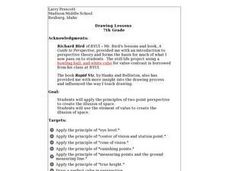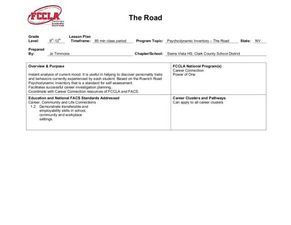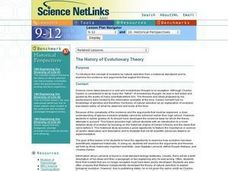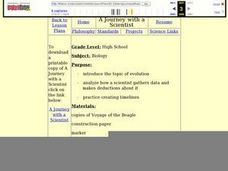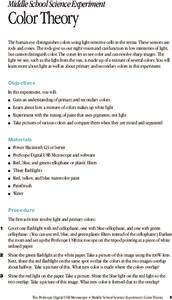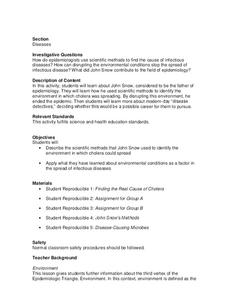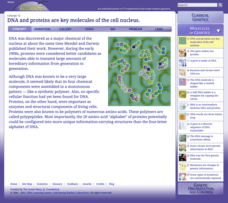NASA
The Big Climate Change Experiment Lesson 5: Climate Change Narratives
And now moving on to the next story. The last of five lessons in Unit 1: The Big Climate Change Experiment requires groups to create a script for a news segment on climate change. They either make a video of their story or conduct a live...
Curated OER
The Origin of Life: Alternative Views
Learners explore the topics of faith and science as they relate to the origins of life. They consider the major points of Darwin's Theory of Evolution and brainstorm various explanations of how life began. Students investigate different...
Curated OER
What are Earthquakes?
Here is a scientific presentation of earthquakes. The elastic rebound theory is explained, as well as the different types of waves and how they are measured. Just a note: Slide number 15 has a diagram that is upside down. Enable editing...
Curated OER
Drawing Lessons
Seventh graders complete a visual acts project that focuses on eye level, center of vision, station point, cone of vision, vanishing points, true height, and drawing a box in two point perspective. They work on a number of still life...
Curated OER
What's in a Name? Considering the Shakespeare Authorship Question
Did Shakespeare really write all that stuff? After viewing a trailer for the film, Anonymous and reading Stephen Marche’s article “Wouldn’t It Be Cool If Shakespeare Wasn’t Shakespeare?” class groups read articles about the Shakespeare...
Curated OER
The Road
Use psychodynamic theory as a part of analyzing a career cluster.The class defines vocabulary words, brainstorms a list of career traits, and completes an online career analysis inventory. They analyze 5 concepts of psychodynamic...
Curated OER
Melting and Freezing of Water
Students examine the three states of matter. They identify the segments of heating and cooling curves. Students analyze data and create a graph to determine the freezing and melting temperature of water.
Curated OER
From Probability to Combinatorics and Number Theory
Students see how division is used to help solve probability problems. They use tables as data structures where they are used to count outcomes and to compute probabilities. Students use games to help solve probability problems.
Curated OER
Number Theory: Scientific Notation
In this scientific notation worksheet, students solve a total of 10 problems, writing numbers given in problems using scientific notation, then numbers given in scientific notation in standard form.
Virginia Department of Education
Cell Parts
What do a bird, an egg, a rabbit, and a toad all have in common? This fun-filled resource explains the similarities and differences between cells and how all cells are similar, yet all are different. Learners begin by depicting a...
Curated OER
The History of Evolutionary Theory
Young scholars are introduced to the concept of evolution by natural selection from a historical standpoint. They examine the evidence and arguments that support the theory of natural selection.
Mr. E. Science
An Introduction to Matter
What's the matter? Gas, solid, liquid, or plasma. The presentation covers how to describe and identify matter, changes in matter, types of matter, measuring matter, particles of matter, Democritus, and John Dalton's Atomic Theory.
Curated OER
A Journey with a Scientist
Students work in groups as they read chapters of Charles Darwin's, Voyage of the Beagle. They take notes on the chapter and in their group make a timeline of the chapter. They tape the timelines together in order to depict the entire...
Curated OER
Classical and Keynesian Views of the Economy
In this economic activity, students answer questions and examine graphs representing the two views on economics. Students are then asked to write about their own opinion.
Curated OER
Public-Choice Economics
Review the principles of public choice economics using this resource. Learners read background information on the theory and theorists. Then they answer five writing prompts in which they are asked to propose a course of action and...
American Institute of Physics
Dr. Gates and the Nature of the Universe
What do Russian nesting dolls have to do with physics? They make a great demonstration tool for explaining Dr. Sylvester James Gates, Jr.'s string theory to young scientists. A two-part lesson first introduces learners to Dr. Gates'...
Curated OER
Things Fall Apart: Question Answer Response Theory
Passages from Chinua Achebe's Things Fall Apart provide the text for a QAR: Question Answer Response comprehension activity. Readers respond to right there, think and search, on your own, and author and you questions.
...
Curated OER
Color Theory
Students are able to gain an understanding of primary and secondary colors. They are able to explore about how a mixture of colors makes up white light. Students are able to experiment with the mixing of paint that uses pigments, not...
Curated OER
Using Social Studies in Five Shared Reading Lessons: Geography
After several short 15-minute mini-lessons, your learners will gain an understanding of the characteristics of a non-fiction text. Using the book Map It by Elspeth Leacock, your class will become acquainted with non-fiction terms...
Centers for Disease Control and Prevention
Diseases
During a cholera outbreak, scientists presented two theories; one theory was based on miasma and the other on germs and contaminated water. The lesson looks at the scientific process for finding the real culprit.
Old Dominion University
Introduction to Calculus
This heady calculus text covers the subjects of differential and integral calculus with rigorous detail, culminating in a chapter of physics and engineering applications. A particular emphasis on classic proof meshes with modern graphs,...
It's About Time
Atoms with More Than One Electron
Provide young chemists with the ability to manipulate atoms and predict their results, in this sixth lesson. Pupils analyze energy patterns as they predict the amount of energy required to remove electrons from atoms. They compare trends...
National Gallery of Canada
One Look Is Worth A Thousand Words
Facial expressions can communicate complex emotions. Examine expressions in several hyperrealistic works of art before beginning a project. Learners will create their own clay faces that show an emotion using either photos or their own...
Cold Spring Harbor Laboratory
DNA and Proteins Are Key Molecules of the Cell Nucleus
When DNA research first began, it required almost an entire day to extract the molecules from a cell nucleus. Now it requires less than an hour. Scholars learn about the early theories of DNA with an online interactive, videos,...
Other popular searches
- Math Number Theory
- Number Theory and Operations
- Number Theory 1
- Number Theory Rounding
- Number Theory Ed Helper
- Number Theory Ii
- Number Theory Edhelper
- Number Theory Concepts
- Number Theory Lesson Plans
- Math + Number Theory
- Egypt Math Number Theory
- Color Tiles Number Theory





